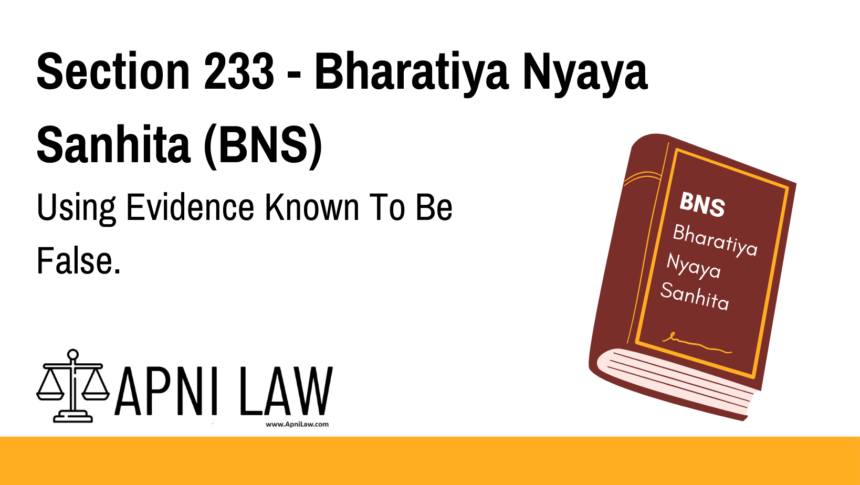Code: Section 233 BNS
Whoever corruptly uses or attempts to use as true or genuine evidence any
evidence which he knows to be false or fabricated, shall be punished in the same manner
as if he gave or fabricated false evidence.
Explanation of Section 233 BNS
Section 233 of the Bharatiya Nyaya Sanhita (BNS) deals with knowingly using false evidence in a legal proceeding. It aims to maintain the integrity of judicial proceedings by ensuring that no person benefits from fabricated or fraudulent evidence.
Key Provisions:
- Knowingly Using False Evidence:
- If a person uses or attempts to use any evidence in a court of law, knowing it to be false or fabricated, they will face punishment.
- Punishment Equivalent to Giving False Evidence:
- The penalty for using false evidence is the same as that for fabricating or giving false evidence. This means the offender can face severe consequences, including imprisonment and fines.
- Objective of This Law:
- The law prevents miscarriage of justice by ensuring that fraudulent evidence does not influence court decisions.
- Related Sections:
- Section 232 BNS – Threatening someone to give false evidence.
- Section 231 BNS – Giving or fabricating false evidence to convict someone.
Illustration
Example 1: Submitting a Fake Document in Court
A submits a forged property document in court to prove ownership of land, knowing that the document is fake. A can be punished under Section 233 BNS, just as if they had fabricated the document themselves.
Example 2: Using a False Witness Statement
X finds out that a witness statement in a criminal case is false, but still submits it in court to support his case. Since X knowingly used false evidence, he is liable for punishment under Section 233 BNS.
Common Questions and Answers on Section 233 BNS
1. What is the punishment for using false evidence?
- The punishment is the same as for fabricating false evidence, which may include imprisonment and fines, depending on the case.
2. Does this law apply only to criminal cases?
- No, Section 233 BNS applies to all legal proceedings, whether civil or criminal.
3. Can a person be punished if they unknowingly submit false evidence?
- No, this section applies only if the person knowingly uses false evidence. If a person was unaware, they cannot be punished.
4. Is an attempt to use false evidence also punishable?
- Yes, even an attempt to use false evidence is punishable under Section 233 BNS.
5. How can someone defend themselves against false accusations under this section?
- If falsely accused, a person must prove their lack of knowledge about the evidence being false. Providing documentation, testimony, or expert opinions can help.
Conclusion
Section 233 BNS ensures that fraudulent evidence does not corrupt judicial proceedings. By imposing strict penalties, the law discourages dishonesty in legal cases and upholds justice.
For more legal insights, visit ApniLaw today! 🚀








